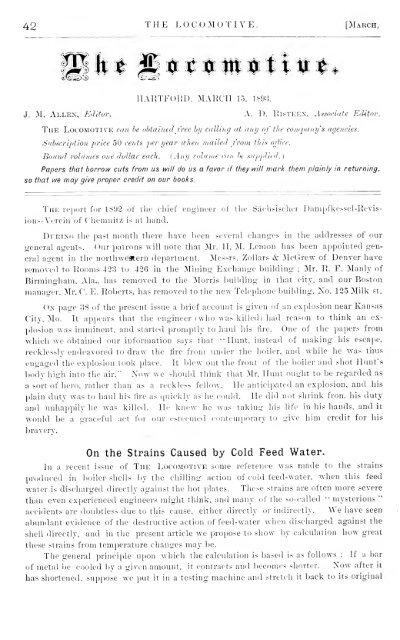The Locomotive - Lighthouse Survival Blog
The Locomotive - Lighthouse Survival Blog
The Locomotive - Lighthouse Survival Blog
You also want an ePaper? Increase the reach of your titles
YUMPU automatically turns print PDFs into web optimized ePapers that Google loves.
42 THE LOCOMOTIVE. [March,<br />
Ml<br />
^^^'3<br />
HARTFORD, MARCH 15, 1893.<br />
Itt.<br />
J. M. Allen, Editor. A. D. Risteex, Associate Editor.<br />
<strong>The</strong> <strong>Locomotive</strong> can he obtained free by calling at any of tlie company^s agencies.<br />
Svbseription price 50 cents per year ichen mailed from this office.<br />
Bound volumes one dollar each. (Any volume can he supplied.)<br />
Papers thai borrow cuts from us will do us a favor if they will mark them plainly in returning,<br />
so that we may give proper credit on our books.<br />
<strong>The</strong> report for 1892 of the chief engineer of tlie Sachsischer Danipfkessel-Revis-<br />
ions-Vcrein of Chemnitz is at hand.<br />
DrRixG the past month there have been several changes in the addresses of our<br />
general agents. Our patrons will note that Mr. H. M. Lemon has been appointed gen-<br />
eral agent in the northw^ern department. ^Messrs. Zollars & ]\IcGrew of Denver have<br />
removed to Rooms 433 to 426 in the Mining Exchange building ; Mr. R. F. Manly of<br />
Birmingham, Ala., has removed to the Morris building in that city, and our Boston<br />
manager, Mr. C. E. Roberts, has removed to the new Telephone building. No. 125 ]Milk st.<br />
On page 38 of the present issue a brief account is given of an explosion near Kansas<br />
City, 3Io. It appears that the engineer (who was killed) had reason to think an ex-<br />
plosion was imminent, and started promptly to haul his fire. One of the papers from<br />
Avhich we obtained our information says that "Hunt, instead of making his escape,<br />
recklessly endeavored to draw the fire from under the boiler, and while he was thus<br />
engaged the explosion took place. It blew out the front of the boiler and shot Hunt's<br />
body high into the air." Xow we should think that Mr. Hunt ought to be regarded as<br />
a sort of hero, rather than as a reckless fellow. He anticipated an explosion, and his<br />
plain duty was to haul his fire as quickly as he could. He did not shrink frort. his duty<br />
and unhappily he was killed. He knew he was taking his life in his hands, and it<br />
would be a graceful act for our esteemed contemporary to give him credit for his<br />
bravery.<br />
On the Strains Caused by Cold Feed Water.<br />
In a recent issue of <strong>The</strong> <strong>Locomotive</strong> some reference was made to the strains<br />
produced in boiler shells by the chilling action of cold feed-water, when this feed<br />
w ater is discharged directly against the hot plates. <strong>The</strong>se strains are often more severe<br />
than even experienced engineers might think, and many of the so-called " mysterious "<br />
accidents are doubtless due to this cause, either directly or indirectly. We have seen<br />
abundant evidence of the destructive action of feed-water when discharged against the<br />
shell directly, and in the present article we propose to show by calculation how great<br />
these strains from temperature changes may be.<br />
<strong>The</strong> general principle upon which the calculation is based is as follows : If a bar<br />
of metal be cooled by a given amount, it contracts and becomes shorter. Now after it<br />
has shortened, suppose we put it in a testing machine and stretch it back to its original
















